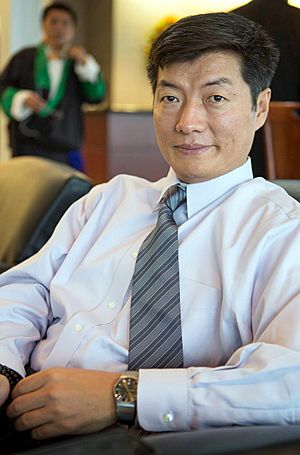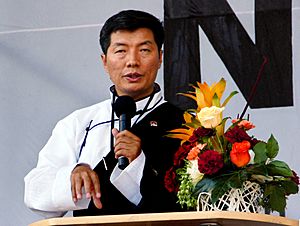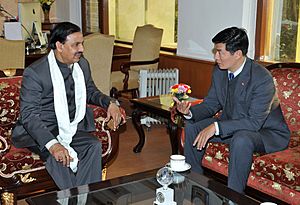Lobsang Sangay facts for kids
Quick facts for kids
Lobsang Sangay
|
|
|---|---|
| བློ་བཟང་སེང་གེ་ | |

Sangay in 2012
|
|
| 1st Sikyong of the Central Tibetan Administration | |
| In office 20 September 2012 – 27 May 2021 |
|
| Succeeded by | Penpa Tsering |
| 13th Kalon Tripa | |
| In office 8 August 2011 – 20 September 2012 |
|
| Preceded by | Lobsang Tenzin |
| Succeeded by | Office abolished |
| Foreign Minister of the Tibetan Administration in Exile | |
| Assumed office 28 February 2016 |
|
| Preceded by | Dicki Chhoyang |
| Personal details | |
| Born | 5 September 1968 Darjeeling, West Bengal, India |
| Citizenship | American |
| Political party | National Democratic Party of Tibet |
| Children | 1 |
| Education | University of Delhi (BA, LLB) Harvard University (LLM, SJD) |
| Lobsang Sangay | |||||||
| Tibetan name | |||||||
|---|---|---|---|---|---|---|---|
| Tibetan | བློ་བཟང་སེང་གེ་ | ||||||
|
|||||||
| Chinese name | |||||||
| Chinese | 洛桑森格 | ||||||
|
|||||||
Lobsang Sangay (Tibetan: བློ་བཟང་སེང་གེ་, meaning "kind-hearted lion"; born 5 September 1968) is a Tibetan-American politician. He was the leader of the Tibetan government-in-exile, called the Central Tibetan Administration, in India. He served as its Sikyong, which is like a president, from 2012 to 2021. Before that, he was the Kalon Tripa from 2011 to 2012.
The Central Tibetan Administration was set up in 1991. This happened after the 14th Dalai Lama decided that Tibet should not seek full independence. Instead, he wanted a different approach. In 1991, the Dalai Lama became the permanent head of this administration. He handled the main duties for Tibetans living outside Tibet.
In March 2011, the 14th Dalai Lama decided to step back from his political duties. He was 71 years old at the time. The rules for Tibetans in exile were quickly updated in May 2011. All parts of the rules about the Dalai Lama's political role were removed.
Sangay was born in Darjeeling, India. He studied international law and democracy at Harvard University in the United States. He is a citizen of the United States.
Contents
Early Life and Education
Sangay was born in 1968 in a Tibetan refugee community in Darjeeling, India. He grew up in a settlement, helping his parents with their small business. He also helped with farm work, like fetching wood and caring for animals.
From 1988 to 1991, Sangay studied English Literature at Hansraj College in Delhi. In 1995, he received a special scholarship called a Fulbright Scholarship. This allowed him to study at Harvard Law School. There, he earned his Master of Laws (LL.M.) degree. Sangay spent 15 years at Harvard University, first as a student and later as a senior researcher.
Academic Career and Research
In 2003, Sangay helped organize five meetings. These meetings brought together Chinese and Tibetan scholars. One important meeting was between the Dalai Lama and 35 Chinese scholars at Harvard University.
In 2004, Sangay made history. He became the first Tibetan to earn a Doctor of Juridical Science (S.J.D.) degree from Harvard Law School. He also won an award for his excellent research paper. His paper was titled Democracy in Distress: Is Exile Polity a Remedy? A Case Study of Tibet's Government-in-exile.
In 2006, Sangay was chosen as one of the "Young Leaders of Asia." This recognition came from the Asia Society. This is a global group that works to improve understanding between people and leaders in Asia and the United States. Sangay was a Senior Fellow at Harvard Law School until 2011. He is an expert in Tibetan law and international human rights law.
Sikyong: Leading the Tibetan Administration
On 14 March 2011, the 14th Dalai Lama decided to give up his political and administrative powers. The rules for Tibetans in exile were updated and became active on 29 May 2011. Sangay noted that Tibetans felt "a high level of anxiety" about the Dalai Lama's decision to step down from his political role.
On 27 April 2011, Sangay was elected as the Kalon Tripa of the Tibetan Administration. He won with 55% of the votes. About 83,400 Tibetans could vote, and 49,000 votes were cast. On 8 August 2011, Sangay officially took office. He became the Sikyong, taking over from Lobsang Tenzin.
As Sikyong, Sangay focused on finding a peaceful solution for Tibet. He supported the Dalai Lama's "Middle Way" approach. This approach aims for real self-rule for Tibet within China's system. He pointed out that China has special systems in Hong Kong and Macau. He argued that a similar solution for Tibet would be good for everyone.
In February 2013, he gave a speech to the Indian Association of Foreign Affairs Correspondence. He talked about the importance of supporting non-violent ways to deal with problems. He asked why Tibetans, who have been peaceful for decades, don't get as much support as groups using violence.
On 10 March 2013, Sangay made a statement. This day marked the 54th anniversary of the Tibetan National Uprising Day. He honored those who fought for freedom and those who died for Tibet. He also repeated his support for the "Middle Way Approach." He hoped that a quick solution for Tibet could be a good example for other struggles for freedom.
In January 2017, the US ambassador to India, Richard Verma, hosted a dinner for Lobsang Sangay. An Indian minister and actor Richard Gere were also there. This event made China upset. In November 2020, Sangay became the first leader of the Central Tibetan Administration to visit the White House in 60 years.
Personal Life
Lobsang Sangay is married to Kesang Yangdon Shakchang. They have one daughter named Menda Rewa. Sangay's father passed away in 2004. Lobsang Sangay holds American citizenship and has a United States passport.
Awards and Honors
Sangay received the Presidential Medal award from Salisbury University in Maryland, USA. This award was given on 13 October 2015. He also received the Gold Medal from the College Historical Society of Trinity College Dublin. This was for his important contributions to public discussions.
Works and Publications
- Tibet: Exiles' Journey, Journal of Democracy – Volume 14, Number 3, July 2003, pp. 119–130
- We Sing a Song of Sadness Tibetan Political Prisoners Speak Out, Billy Jackson, Publish America, 2004, ISBN: 1-4137-1677-6
- China in Tibet: Forty Years of Liberation or Occupation?, Harvard Asia Quarterly, Volume III, No. 3, 1999.
- Human rights and Buddhism : cultural relativism, individualism & universalism, Thesis (LL. M.), Harvard Law School, 1996,
- Democracy in distress : is exile polity a remedy? : a case study of Tibet's government in exile, Thesis (S.J.D.), Harvard Law School, 2004,
- A constitutional analysis of the secularization of the Tibetan diaspora : the role of the Dalai Lama, in Theology and the soul of the liberal state, ed. Leonard V Kaplan; Charles Lloyd Cohen, Lanham : Lexington Books, 2010, ISBN: 978-0-7391-2617-2
- The Battle for the Soul of the Dalai Lama, Foreign Affairs, 6 November 2023
See also
 In Spanish: Lobsang Sangay para niños
In Spanish: Lobsang Sangay para niños
- List of foreign ministers in 2016
- List of foreign ministers in 2017
- List of current foreign ministers
- Foreign relations of Tibet
 | Kyle Baker |
 | Joseph Yoakum |
 | Laura Wheeler Waring |
 | Henry Ossawa Tanner |



